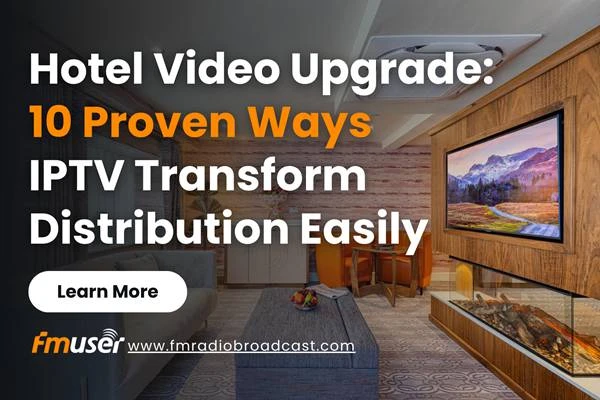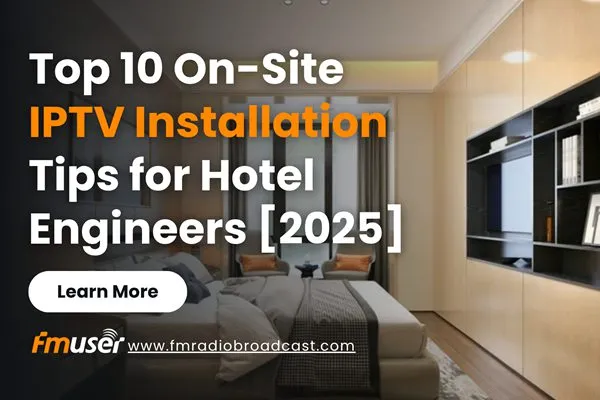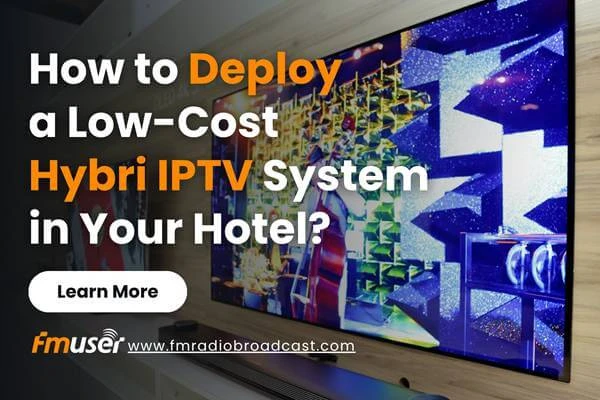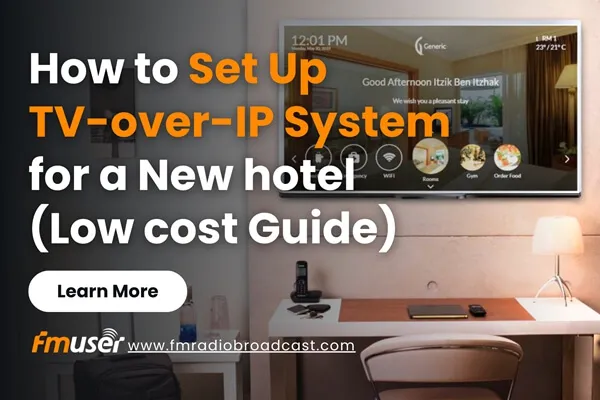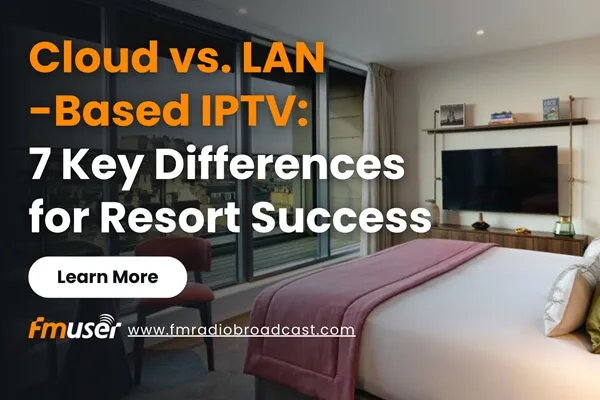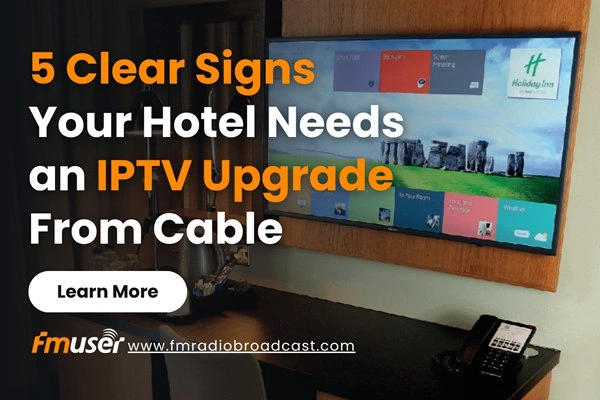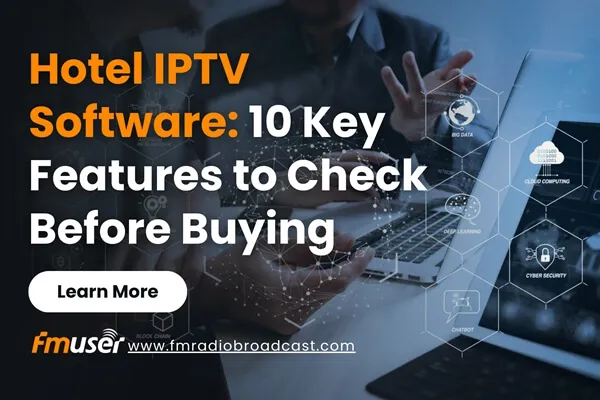
Hot tag
Popular search
How to Eliminate Fuzzy TV Screens in Hotels Using IPTV (Cost-Effective Guide)

1. Introduction: The Hidden Costs of Fuzzy Hotel TVs
1) The Guest Experience Nightmare
Imagine a guest settling into their hotel room after a long journey, eager to unwind with their favorite show—only to find a blurry, pixelated screen that buffers endlessly. Within minutes, frustration sets in, followed by a scathing review: “TV quality was terrible—couldn’t even watch the game!”
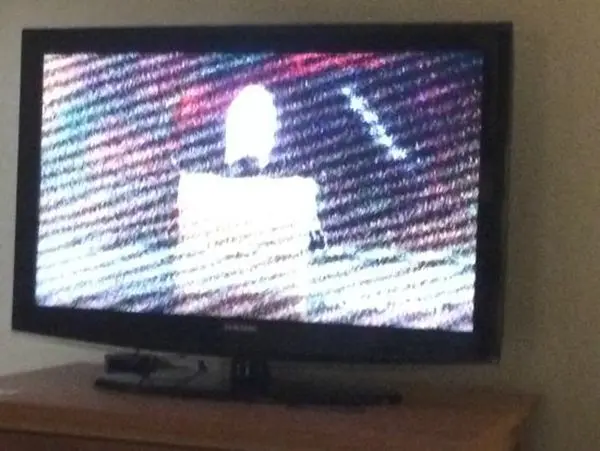
This scenario isn’t uncommon. Across hotels using outdated cable systems, fuzzy screens, buffering issues, and complaints about “grainy TV” or “half-fuzzy screens” plague guest experiences, directly impacting satisfaction scores and loyalty.
👇👇 New Arrival! 👇👇
FMUSER FBE013 Magic IPTV STB Kit with RC
|
FMUSER FBE013 IPTV Smart Hotel Magic Box Kit with RC! Click here for details.
|
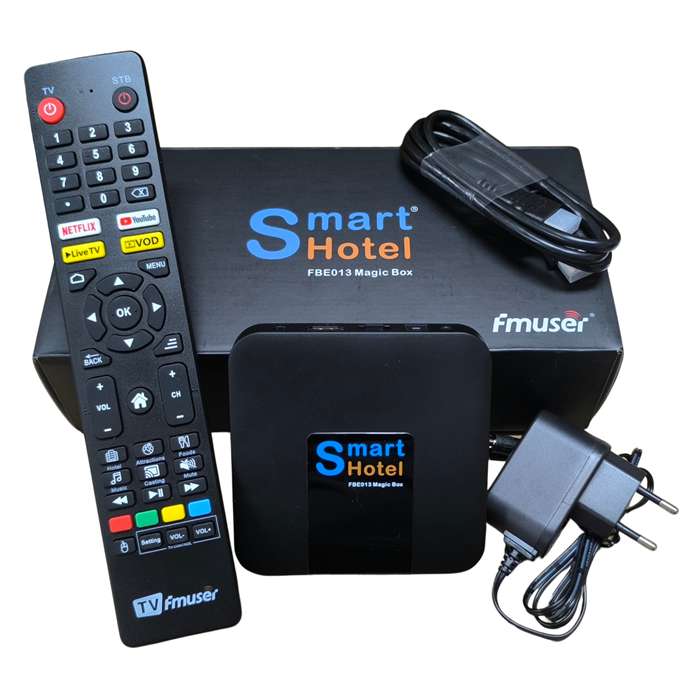 |
You may like: 10 Proven Ways How IPTV Reshapes Hotel Video Distribution
2) Outdated Cable = Poor Quality + High Costs
The root of these issues? Aging cable TV infrastructure. Traditional systems rely on costly per-room cable boxes, with subscription fees that quickly spiral for larger properties.
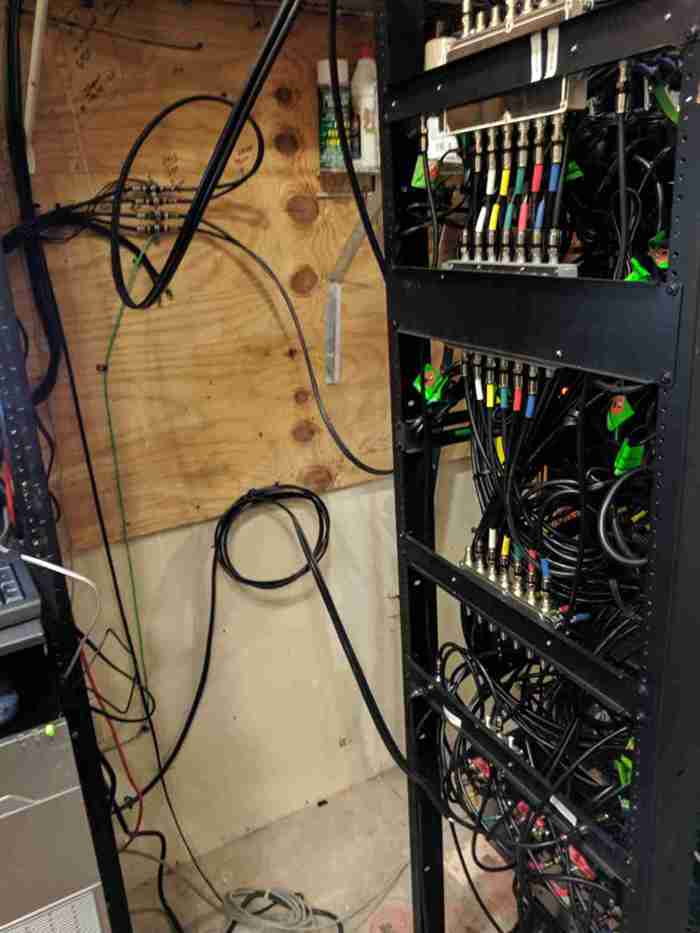 |
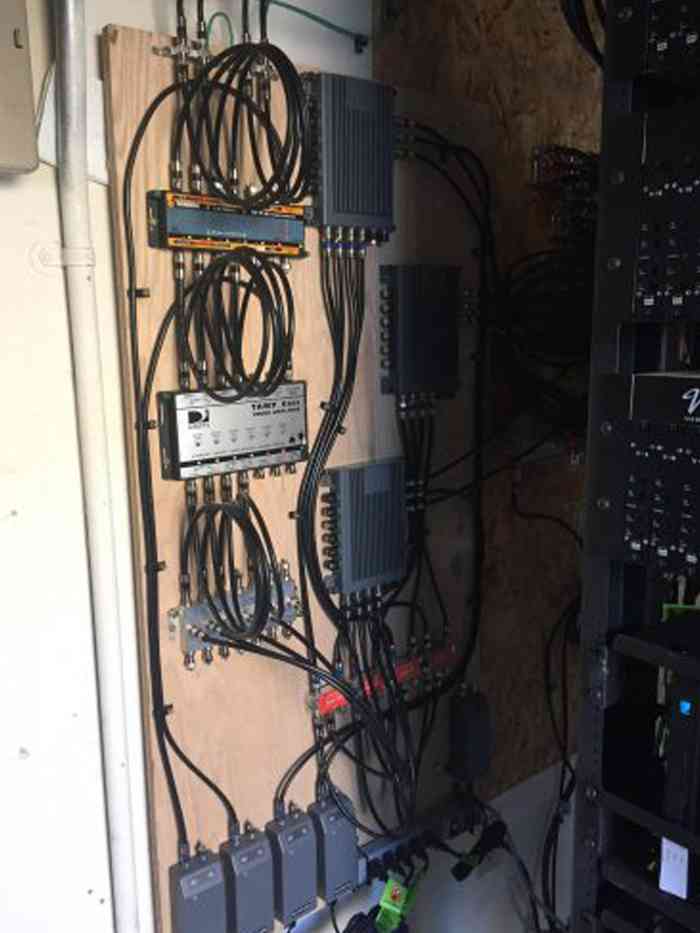 |
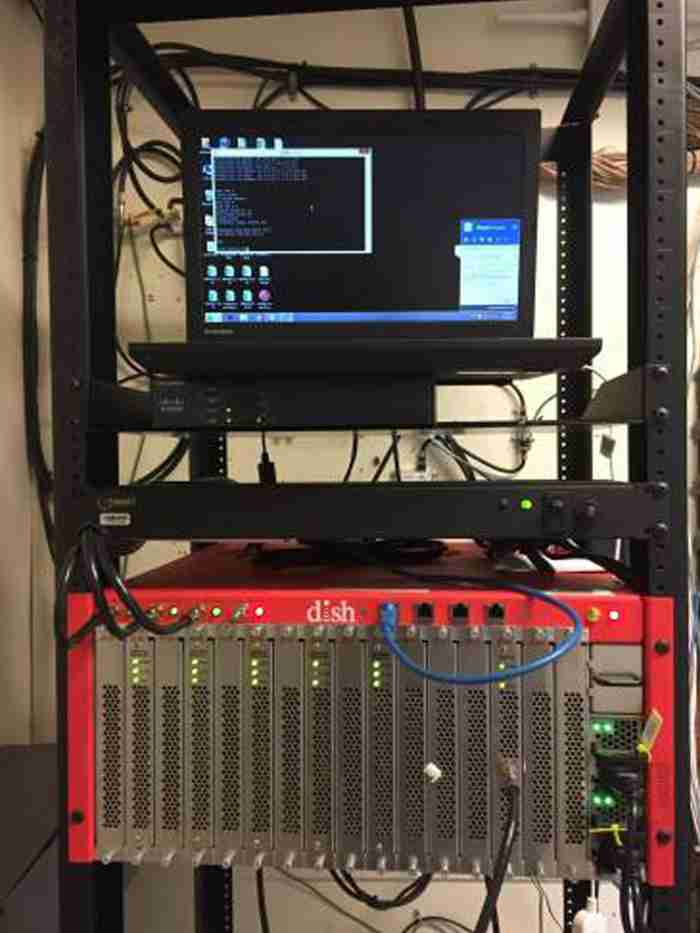 |
Worse, cable’s analog signals degrade over long distances, leading to distorted images and laggy streaming—problems amplified in older hotels with outdated wiring. Guests today expect crisp, instant 1080p streaming, but cable systems struggle to deliver.
Even for new hotels, cable offers zero flexibility: no way to add promo channels, local broadcasts, or interactive features. Want to screen welcome messages or lobby ads? With cable, you’re stuck.
You may like: Top 10 On-Site IPTV Installation Tips for Hotel Engineers [2025]
3) Transition to IPTV: A Clear, Cost-Effective Upgrade
Here’s the good news: Modern LAN-based IPTV systems eliminate these pain points. By converting TV signals to IP (Internet Protocol), hotels can ditch pricey cable boxes, slash subscription costs, and deliver flawless HD streaming to every room.

With solutions like FMUSER’s scalable IPTV architecture, hotels can:
- Fix blurry screens instantly by transmitting 1080p HD via existing LAN networks.
- Cut costs by replacing dozens of cable boxes with a single HDMI encoder (e.g., broadcast a DSTV channel to 100+ rooms with one device).
- Customize freely—add UHF channels, live streams, promo videos, or even integrate satellite feeds.
As guests demand better in-room entertainment, sticking with cable risks your reputation and revenue. In the next sections, we’ll break down how IPTV solves fuzzy screens, unlocks new revenue streams (like in-room ads/VOD), and positions your hotel as a modern, guest-focused destination—all while saving thousands on outdated hardware.
By the end, you’ll see why leading hotels are making the switch—and how to start your own upgrade.
You may like: How IPTV Slashes 80% DSTV Boxes for Small Africa Hotels?
Contact Now, We're Here to Help!
2. Why Outdated Cable Systems Hurt Your Bottom Line
Why does my TV look blurry? Why is streaming so laggy?” Guests aren’t the only ones asking—hoteliers lose revenue daily to clunky cable systems. Here’s how obsolete infrastructure drains budgets and damages reputations

1) Pain Point 1: Sky-High Subscription Fees
Outdated cable systems force hotels to install cable boxes in every room, each with its own monthly subscription. For a 100-room hotel, this means 100 separate fees—costs that multiply yearly. Worse, cable’s analog signals often require additional amplifiers and rewiring to combat pixelation or fuzzy screens, adding hidden expenses.
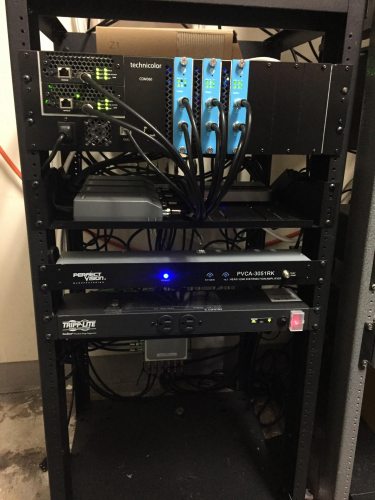 |
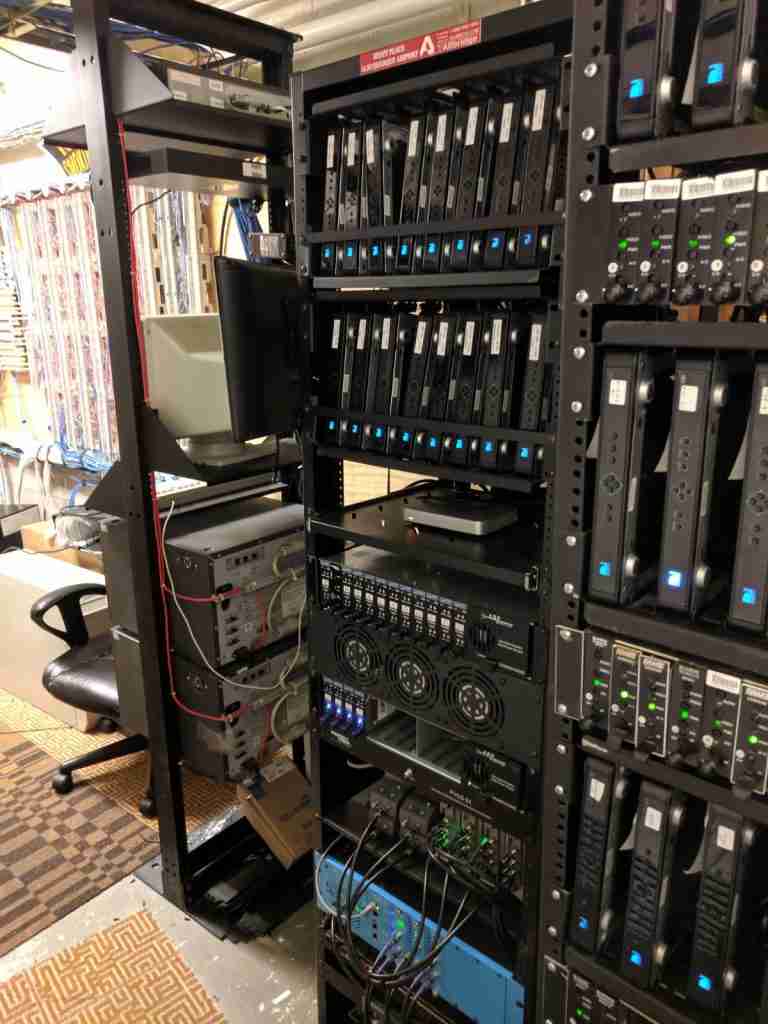 |
You may like: How to Deploy a Low-Cost Hybrid IPTV System in Your Hotel
2) Pain Point 2: Zero Flexibility = Missed Opportunities
Cable systems lock hotels into rigid, pre-packaged channel lists. Want to add local news via UHF? Promote your spa with lobby ads? Stream free-to-air satellite channels like Canal+? With cable, it’s nearly impossible due to inflexible display options.
Example: A Lagos hotel couldn’t integrate its DSTV sports package into guest rooms without buying 50+ extra boxes. Result? Angry soccer fans and lost upsell revenue.
You may like: Top 10 Hotel TV System Providers in 2025 [Pros & Cons Guide]
3) Pain Point 3: Blurry Screens, Buffering, and Guest Fury
Aging coaxial cables degrade over time, leading to ghosting images, foggy tv screens, and buffering—issues cable providers rarely fix. Guests mistake these for “bad Wi-Fi,” but the real culprit is outdated hardware.

Technical Note: Analog signals weaken over distance, causing “why is my tv fuzzy” complaints. Switching to IPTV’s digital encoding eliminates this instantly.
You may like: Hotel TV Upgrade: 5 Key Challenges & How to Fix Them [2025]
4) Pain Point 4: Bad Reviews = Lost Bookings
A single angry review about “blurry streaming” or “unwatchable TV” can tank your ratings. For African hotels targeting international guests, poor in-room entertainment implies neglect—guests may book competitors with modern IPTV next time.
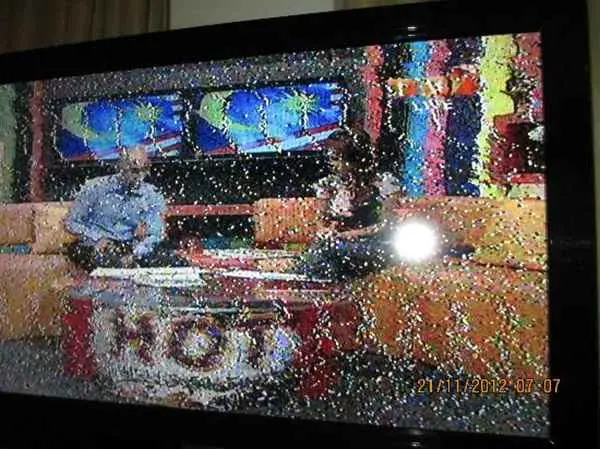
Real Impact:
- 67% of travelers say in-room tech (like HD TV) influences booking decisions.
- Properties with IPTV systems report 23% fewer complaints about TV quality.
Cable’s hidden costs go beyond fees—poor quality damages your brand. Upgrading to IPTV isn’t just about fixing fuzzy tv screens; it’s about protecting revenue and reputation.
So how does IPTV solve these problems while boosting ROI? Let’s break down the tech that rescues hotels from fuzzy-screen purgatory.
You may like: How to Set Up a TV-over-IP System for New hotel (Low cost)
Contact Now, We're Here to Help!
3. How IPTV Fixes Blurry Screens (and Boosts Guest Experience)
If fuzzy TVs and sky-high cable fees are dragging your hotel’s reputation and budget, IPTV flips the script. Here’s how modern IP encoding not only erases “blurry tv screens” but turns in-room entertainment into a revenue engine.
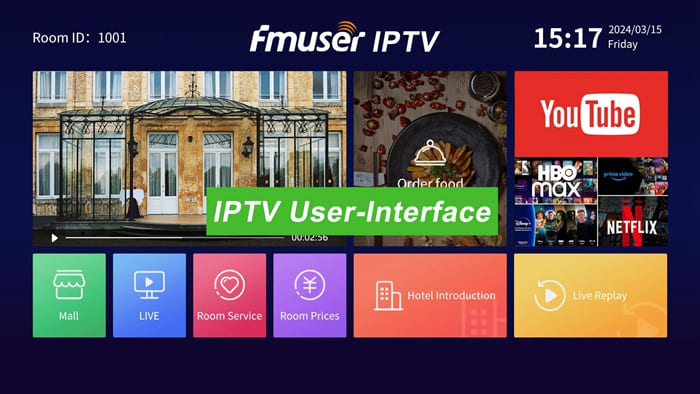
1) HD Streaming via IP Encoding: Crystal-Clear Quality, Zero Pixelation
Outdated cable systems rely on analog signals that degrade over distance, causing “tv picture is pixelated” and “foggy tv screen” complaints. IPTV solves this by converting all content (live TV, streaming apps, satellite feeds) into digital 1080p HD signals transmitted via your existing LAN network.
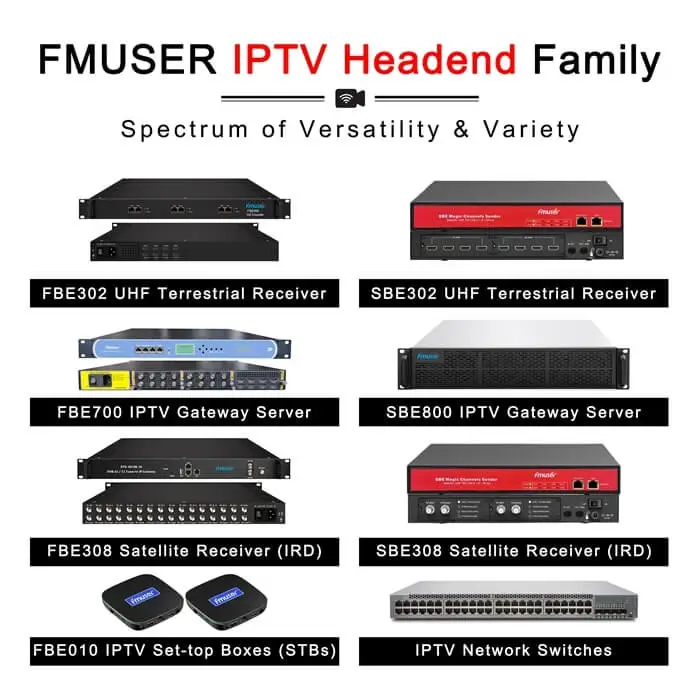
How It Works:
- Signals stay crisp across long distances (no analog interference).
- Guests enjoy instant, buffer-free streaming—no more “why is my streaming tv blurry?” questions.
You may like: Cloud vs. LAN IPTV: 7 Key Differences for Resort Success
2) Scalable Content Integration: Mix Local Channels, Ads, and More
Why settle for rigid cable packages? IPTV systems use IPTV encoders (like those from FMUSER) to seamlessly blend content sources:
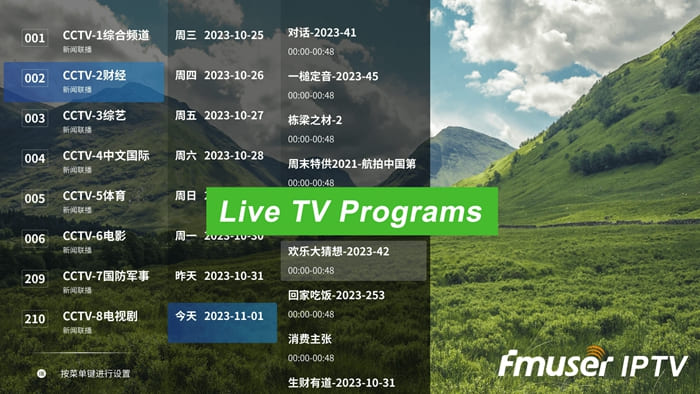
- Local UHF channels for regional news.
- HDMI inputs for DSTV/Canal+ sports packages (broadcast one subscription to 100+ rooms via a single encoder).
- Satellite feeds or hotel-run promo videos (e.g., spa ads).
You may like: IPTV Subscription vs. Ownership: Which Saves Resorts More?
3) Slash Costs: 1 Encoder vs. 100 Cable Boxes
Forget per-room subscriptions. With IPTV, a single HDMI encoder can distribute a premium channel (e.g., DSTV SuperSport) to every TV—no extra fees.
Savings Breakdown:
- Cable: 100 rooms = 100 boxes x $30/month = $3,600/month.
- IPTV: 1 encoder + IP network = $300/month (for the same channel).
That’s 90% savings—funds you could redirect to guest amenities.
You may like: 10 Questions to Ask When Procuring Lodging TV Systems
4) Interactive Features: Turn TVs into Revenue Machines
Beyond fixing fuzzy screens, IPTV unlocks features cable can’t match:
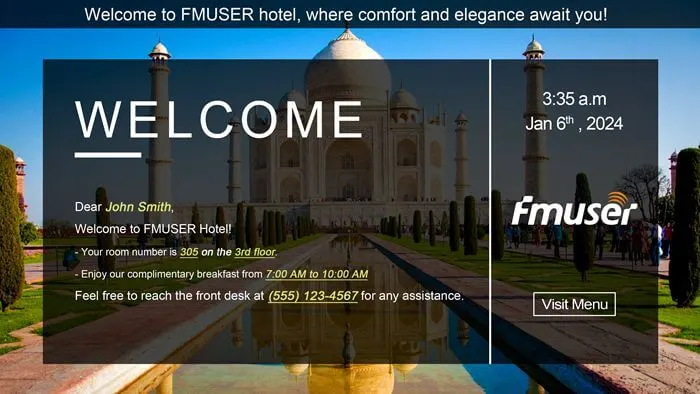 |
 |
 |
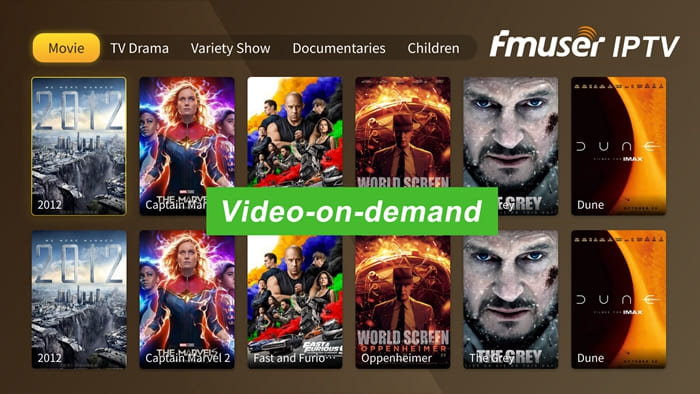 |
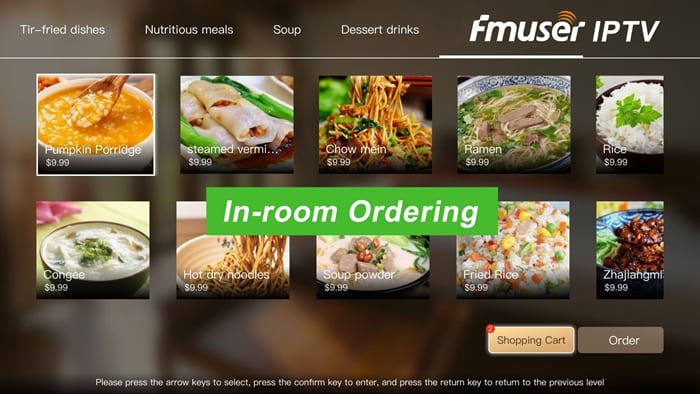 |
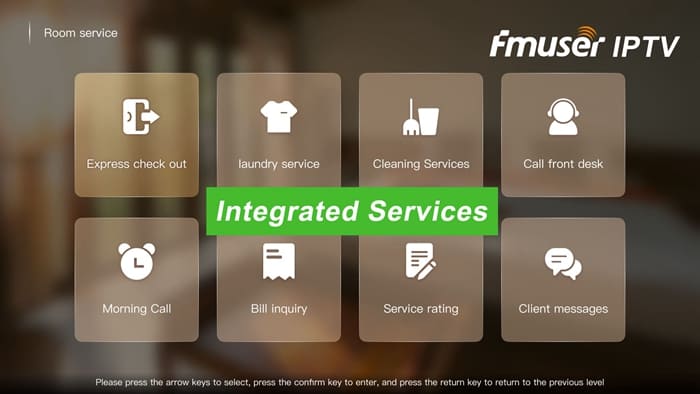 |
- Lobby Promos: Display events or restaurant specials.
- Welcome Messages: Greet guests with branded videos.
- VOD Library: Rent movies for extra income.
- Forced Ads: Monetize with local business ads during shows.
Upgrading to IPTV isn’t just about fixing “tv picture distortion”—it’s a smart financial play. Next, we’ll compare the long-term ROI of IPTV vs. clinging to cable.
You may like: Hotel IPTV Software: 10 Key Features to Check Before Buying
Contact Now, We're Here to Help!
4. IPTV vs. Cable: Long-Term Savings & Customization
Hotel IPTV ROI isn’t just hype—it’s a math problem. Let’s break down why switching to LAN-based IPTV saves money and future-proofs your property, especially in cost-sensitive markets like Africa.
1) Ownership vs. Subscriptions: Where Your Money Goes
| Cable TV | Cloud-Based IPTV | LAN-Based IPTV (FMUSER’s Model) |
|---|---|---|
|
|
|
A 50-room hotel in Ghana replaced DSTV boxes (costing $1,500/month) with a LAN-based IPTV system. Savings? $18,000/year—enough to renovate their lobby.
You may like: 5 Clear Signs Your Hotel Needs an IPTV Upgrade From Cable
2) Africa-Focused Solutions: Durability Meets Affordability
Cable and cloud systems often ignore Africa’s unique needs: limited bandwidth, budget constraints, and demand for local content. FMUSER’s IPTV hardware addresses this with:
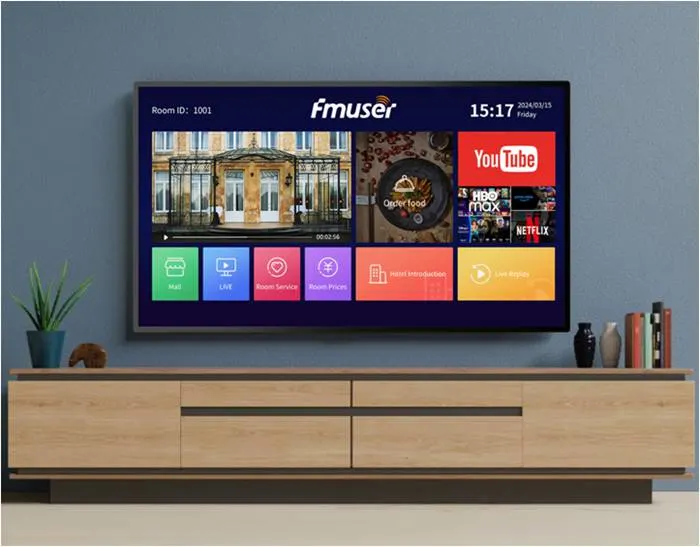
- Offline Functionality: Operates without stable internet (critical for remote lodges).
- Local Content Ready: Integrate free-to-air satellite, UHF broadcasts, or FM radio easily.
- Cost-Effective Encoders: Devices like the FBE700 IPTV Gateway handle 100+ rooms at a fraction of cable costs.
A Tanzanian beach resort upgraded to IPTV, slashing annual TV expenses by 60% while adding Swahili news and safari live streams—guests rated their TVs “excellent” post-upgrade.
You may like: 7 Key Solutions to Earn 10K+ Residence Subscribers with IPTV
3) Future-Proofing: Grow Without Rewiring
Cable systems require costly rewiring to add channels or rooms. IPTV uses your existing LAN network, letting you:
- Scale Instantly: Add 50 rooms? Just plug new TVs into the network.
- Mix Content Sources: Add HDMI feeds (e.g., conference room presentations) or UHF signals in hours, not weeks.
A Nigerian hotel chain integrated IPTV across 4 properties using their current LAN. They now share promo videos chain-wide with a single click.
You may like: IPTV Meets Casting: 5 Proven Hacks to Delight Hotel Guests
4) The ROI Breakdown
| Metric | Cable TV | LAN-Based IPTV |
|---|---|---|
| Upfront Cost | Low (but boxes pile up) | Moderate (hardware) |
| Monthly Fees | High (per-room subs) | $0 (after setup) |
| Customization | None | Full control |
| Lifespan | 3-5 years | 8-10+ years |
Key Takeaway: IPTV pays for itself in 12-18 months for most hotels. After that, savings go straight to your bottom line.
Now that the financial perks are clear, how do you implement IPTV without disrupting operations? Let’s map out a stress-free upgrade plan.
You may like: Home IPTV System: A Quick Build Guide at Low Cost
Contact Now, We're Here to Help!
5. Implementing IPTV in 3 Simple Steps
Worried that upgrading your hotel’s TV system sounds too technical? With IPTV, fixing blurry TV screens and transforming guest experiences boils down to three stress-free steps
Step 1: Replace Cable Boxes with Scalable IPTV Hardware
Outdated cable infrastructure relies on expensive, room-specific boxes prone to signal degradation. FMUSER’s LAN-based IPTV system replaces these with versatile, hotel-owned hardware:

- Commercial UHF Receivers: Capture local broadcasts (e.g., regional news, free-to-air channels) without added subscriptions.
- HDMI Encoders: Integrate paid channels like DSTV or Canal+ by connecting a single decoder to an encoder, distributing the signal to all rooms via LAN (eliminating the need for one box per room).
- IPTV Gateway Servers: Convert RF signals from satellite dishes or analog sources into IP streams for 0-latency, 1080p HD delivery.
A 100-room hotel using 10 DSTV channels? With LAN-based IPTV, you’d need just 1 HDMI encoder with 10 HDMI input (not 100 boxes), saving $2,700/month at $30/box.
Step 2: Encode All Signals into IP for Flawless Streaming
FMUSER’s equipment transforms every video source into high-definition IP streams:
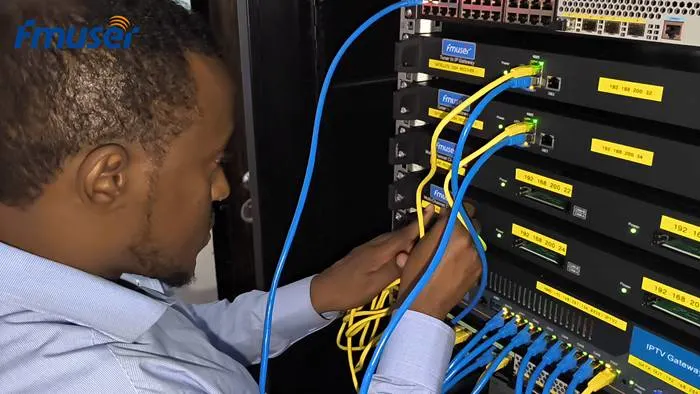
- Satellite Content: Connect existing DStv/Analog receivers as well as sateliite dishes (for FTA or CAM content) to sateliite recevier to broadcast encrypted channels hotel-wide.
- Analog/UHF Signals: Use encoders to digitize local RF channels (e.g., community TV) and avoid "foggy screen" issues caused by weak analog signals.
- Custom Content: Plug promo videos or live event feeds into HDMI encoders for lobby displays or in-room welcome messages.
Why LAN beats cloud: Unlike cloud-based systems (which lock you into subscriptions and limited control), FMUSER’s LAN setup ensures full ownership—no third-party fees or dependency.
Step 3: Deploy & Customize Without Hidden Costs
Once encoded, content streams seamlessly over your LAN network:
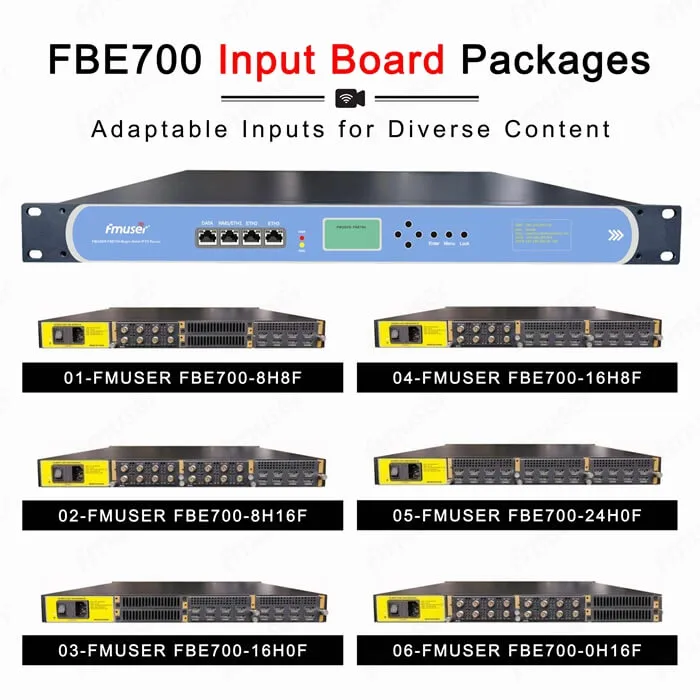
- Scalable Distribution: Start with 10 channels and expand as needed—no rewiring or costly hardware swaps.
- Zero Buffering: LAN-based transmission eliminates lag, resolving "blurry streaming" complaints instantly.
- Monetization Features: Add Video-on-Demand (VOD) libraries or forced ads via FMUSER’s software, with no SaaS fees (unlike cloud models).
Bonus Savings: Avoid cloud IPTV’s pitfalls:
- No Customization Fees: Tailor channel lineups or ads in-house.
- No Per-Room Subscriptions: Pay once for hardware—it’s yours forever.
Why Hoteliers Choose FMUSER’s LAN-IPTV
- Africa-Friendly: Designed for regions with limited internet—works offline once installed.
- Future-Proof: Add 4K streaming or interactive apps later without overhauling hardware.
- 24/7 Support: Expert help for issues like "Samsung TV blurry screen" or encoder configurations.
Contact Now, We're Here to Help!
6. FAQ: Solving Blurry Hotel TV Screens with FMUSER’s LAN-Based IPTV
Q1: How does a LAN-based IPTV system fix blurry or fuzzy hotel TV screens?
A1: FMUSER’s LAN-based IPTV eliminates blurry screens by converting analog cable/satellite signals into digital 1080p HD streams transmitted via your hotel’s existing LAN network. Unlike outdated coaxial cables, which degrade over distance and cause pixelation, IPTV ensures stable, high-quality signals to every room. For example, our IPTV encoders compress signals with zero latency, resolving issues like "half-fuzzy screens" or "grainy streaming" caused by old cable infrastructure.
Q2: Will IPTV work with our existing DSTV or Canal+ subscriptions?
A2: Yes! FMUSER’s IPTV integrates seamlessly with DSTV, Canal+, or other subscription services. Instead of requiring one box per room, you can connect a single HDMI encoder to your DSTV decoder, distributing the signal to all TVs via LAN. This setup slashes subscription costs by up to 90% while maintaining crisp quality—no more "why is my TV blurry when streaming?" complaints.
Q3: What upfront costs are involved in switching from cable to IPTV?
A3: Costs depend on your hotel’s size and needs. FMUSER offers customized packages starting with essentials like IPTV gateways, encoders, and servers. For example, a 50-room hotel might invest in 3-5 HDMI encoders and a server for ~$5,000-$8,000 upfront. This one-time cost replaces recurring cable box fees, typically paying for itself in 12-18 months through subscription savings alone.
Q4: Can IPTV handle localized content like UHF channels or FM radio?
A4: Absolutely. FMUSER’s system supports multi-source integration, including UHF antennas, HDMI inputs, and FM radio feeds. Our solution is ideal for African hotels needing local Swahili news, Arabic channels, or community radio streams. Simply plug UHF receivers into an IP encoder, and distribute channels hotel-wide—no rewiring required.
Q5: How long does installation take? Will it disrupt guest operations?
A5: Most hotels complete installation in 3-7 days with minimal downtime. FMUSER’s team conducts audits to streamline setups—existing LAN networks are reused, and encoders can be installed during low-occupancy periods. We also offer 24/7 remote support to resolve issues like "Samsung TV blurry screen" errors without on-site delays.
Q6: What if our staff isn’t tech-savvy? Is training provided?
A6: FMUSER includes free training on our user-friendly IPTV software, which lets staff schedule ads, manage channels, or troubleshoot pixelation via a dashboard. Most teams master basics in 1-2 hours. For ongoing support, our engineers provide live assistance via Zoom/TeamViewer.
Q7: Can we add video-on-demand (VOD) or lobby promos later?
A7: Yes—FMUSER’s system scales effortlessly. Start with live TV, then add VOD libraries, promo videos, or forced ad slots via software updates. For example, a Kenyan resort added a safari live stream to rooms post-installation, boosting guest engagement by 40%.
Q8: How does IPTV compare to cloud-based systems for long-term costs?
A8: LAN-based IPTV (like FMUSER’s) saves significantly over cloud models. Cloud systems charge monthly fees ($10-$20/room), whereas FMUSER’s hardware requires no subscriptions after purchase. Our ownership model also gives full control over content and upgrades, making it ideal for hotels prioritizing long-term ROI and quality fixes like "blurry television screens."
Contact Now, We're Here to Help!
7. Conclusion: Upgrade Now, Save Later
Outdated cable systems aren’t just annoying—they’re expensive reputation killers. Guests demand crisp 1080p screens, instant streaming, and interactive features, all of which IPTV delivers while solving stubborn issues like:
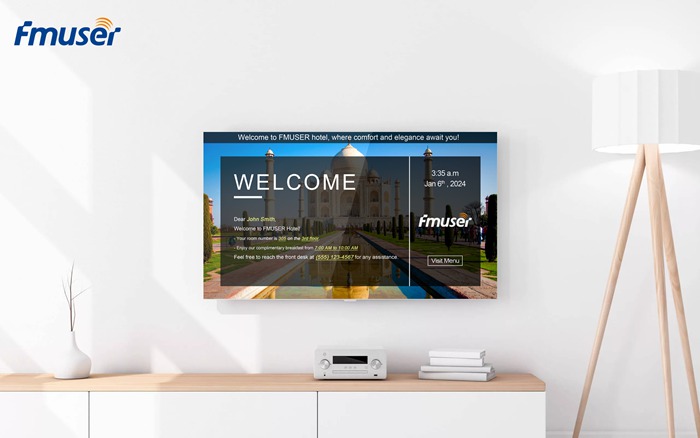
- “Fuzzy television screens” → Replaced with HD streaming via LAN.
- “Buffering lag” → Eliminated with IP signal stability.
- “Sky-high fees” → Slashed by up to 90% with scalable encoders (like FMUSER’s hardware).
Beyond fixing blurry screens, IPTV turns TVs into profit centers. Imagine:
- Earning $500/month from in-room movie rentals (VOD libraries).
- Boosting bookings with stunning lobby promos or live safari feeds.
- Cutting cable bills permanently—funds you can reinvest in staff or amenities.
The math is simple: IPTV pays for itself in under two years, then keeps saving you money—all while delighting guests. For African hoteliers, the time to act is now, as competitors cling to obsolete cable.
.
.
Next Steps → Schedule a free FMUSER consultation to:
- Audit your current setup (cable/satellite costs, quality pain points).
- Design a custom IPTV plan (hardware + software tailored to your budget).
- Launch in 30 days with 24/7 support to ensure zero downtime.
Every month with cable costs you money and guests. IPTV isn’t just an upgrade—it’s a long-term strategy to lead your market. Fix fuzzy screens, boost ratings, and own your system. The future of hotel TV is clear.
Contact Now, We're Here to Help!
Tags
Contents
Related Articles
CONTACT US


FMUSER INTERNATIONAL GROUP LIMITED.
We are always providing our customers with reliable products and considerate services.
If you would like to keep touch with us directly, please go to contact us

